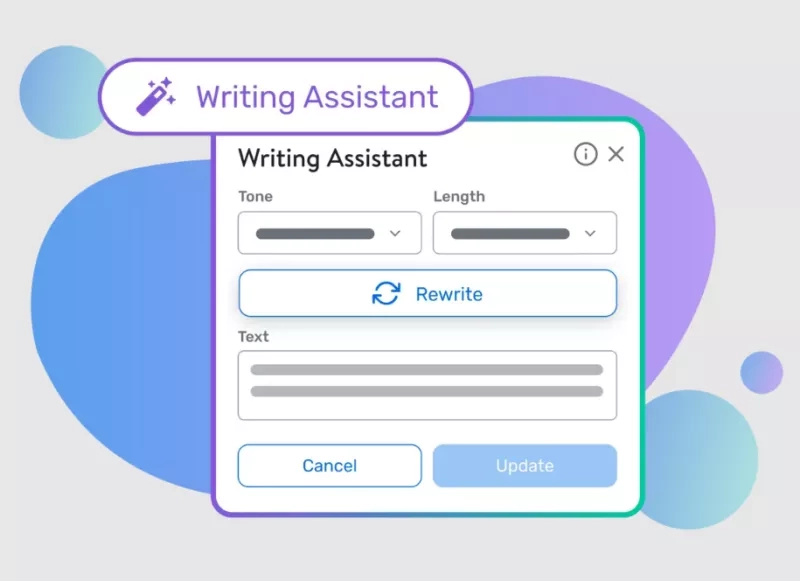To say the topic of artificial intelligence (AI) has been in the news lately would be an understatement. AI’s applications and possibilities have got the world of events talking. And busy marketers everywhere are sitting up to listen.
Event AI has the potential to change the way marketers work for the better. But it’s a whole new world, and there are a lot of things to consider before diving in. That’s what we’re here for. This blog will explore how your organisation can get started with AI, the pros and cons, and essential tools to get the job done.
How are marketers using AI?
Marketers are already making their working days happier and less stressful using AI. According to HubSpot, 90% of marketers surveyed use AI to spend less time on manual tasks – 12.5 hours less, in fact.
The 2023 Sprout Social Index reveals that 78% feel AI enables marketers to become more creative in content ideation. And 73% say it has positively impacted their productivity.
When you think that marketers spend at least five hours a day on administrative tasks, it almost sounds too good to be true! So, let’s look at the top use cases for AI in marketing and how this applies to events:
1. Creating content
From lengthy eBooks and blogs to countless emails and ads, content marketing isn’t just necessary; it’s vital. But there’s no getting away from the fact that brainstorming and creating content that both engages and converts takes patience and time.
Generative AI – such as the well-known ChatGPT or Google’s Bard could help you save time. HubSpot reports that AI helps 83% of marketers create significantly more content than they could without. Asking generative AI tools the right questions (prompts) is a great place to start:
"Generate three event taglines for a tech conference aimed at entrepreneurs."
"Create a social media post to promote a music festival targeting young adults."
"Craft email subject lines to increase attendance at a food and wine tasting event."
"Devise promotional slogans for a fitness expo highlighting wellness and healthy living."
"Write a press release announcing a charity gala fundraiser for a local cause."
Note, however, that when it comes to content and copy creation, you know your audience, subject matter, and brand voice best. HubSpot reports that 96% of the time, AI content isn’t complete enough to publish on its own. Give all AI content a thorough edit before publishing.
2. Analysing data and feedback
With event marketing comes the necessity of analysing data and audience feedback. Stakeholders want to know what worked and what didn’t and how your marketing efforts contributed to the success of the event.
But unless you’re into that sort of thing, manually analysing data can be a tedious, time-consuming process. It can also lead to human error and biases. Let’s explore some of the ways AI could help you analyse data:
Sentiment analysis: Natural Language Processing (NLP) techniques enable AI to analyse text data from sources like social media comments, event reviews, and survey responses. Sentiment analysis tools can determine the overall sentiment (positive, negative, or neutral) towards the event.
Predictive analytics: By leveraging machine learning models, AI can predict future trends, attendee behaviour, and event outcomes based on historical data. Event marketers can use these predictions to make informed decisions about event planning, marketing strategies, and resource allocation.
Real-time insights: AI algorithms can provide real-time insights into event performance, audience engagement, and sentiment during the event itself. Marketers can use these insights to make on-the-fly adjustments, address issues promptly, and enhance the overall event experience.
3. Conducting research and gaining inspiration
For a long time, an unavoidable part of inspiration-hunting or research has been scouring Google. And that’s before you even find anything worth its salt.
AI propels you into action by giving you a basic starting point. HubSpot reports that 22% of marketers use AI for ideas and inspiration while 48% use it to conduct research. Here’s how it could help:
Content generation: AI-powered content generation tools enable you to generate ideas for event themes, topics, and promotional materials.
Trend analysis: AI algorithms enable you to analyse trends in the event industry, as well as related fields such as technology, fashion, and entertainment to identify emerging trends.
Competitor analysis: AI tools enable you to analyse competitor events, marketing strategies, and audience engagement tactics to identify strengths, weaknesses, and opportunities for differentiation.
4. SEO planning and keyword research
If you want your content to attract lots of web traffic and lead to event registrations, search engine optimisation (SEO) planning and keyword research are essential. That includes aligning your web content with the search intent of your ideal audience, improving your website’s user experience, and finding ways to raise your search engine result page (SERP) ranking.
Well, AI can help you do all three of these tasks. Here are some best practices when applying AI to SEO:
Experiment with and develop your prompts: Much like creating content, the well-thought-out prompts will help you get accurate SEO information aligned with your audience.
Don’t be afraid to follow up: The great thing about AI is that you can ask as many questions as you like. Try multiple queries until you get what you’re looking for.
Have a goal, but start small: Avoid going in straight away by asking AI to create an SEO strategy. Instead, ask for keywords and their keyword volumes and go from there.
Fact check your SEO findings: Using AI for keyword research doesn’t mean saying goodbye to your keyword tools. Always crosscheck your findings to ensure accuracy.
5. Content repurposing
After investing months in meticulously crafting compelling scripts, handouts, and presentations, many event marketers overlook the opportunity to repurpose their content.
This enables you to extend the reach of your events, resulting in increased leads, heightened brand awareness, enhanced audience engagement, and reduced workload.
HubSpot reveals that one in five marketers (21%) use AI to summarise long-form content into key points. This is a great way to turn a 5,000-word eBook into a much shorter blog or even an email.
💡Read more: 11 Genius Ways to Repurpose Your Event Content Like a Pro
6. AI-Powered Chatbots
Chatbots have been kicking around for years in the marketing world. They’ve been answering customer questions and making your workloads that little bit more manageable. Now generative AI is on the scene, however, the power of chatbots is coming to the forefront. They’re becoming smarter.
Much like a rules-based chatbot, those powered by AI can provide availability to your customers 24/7. But using machine learning (ML) and natural language processing (NLP), AI chatbots interpret a customer’s question and provide an automatic, unique response.
AI chatbots never stop learning. Overtime and with more conversations under its belt, the tool will improve its responses. Sprout Social reveals that 54% of marketers plan to use chatbots in 2024 for social customer care, FAQs, and customer forums.
Pros and cons of AI in marketing
The benefits of artificial intelligence for event marketers are clear. AI helps you save time and enables you to do more with less. Used ethically and effectively, it has the potential to not only change event marketing for the better but also working lives.
But AI doesn't come to us without its risks. And it’s the responsibility of the user to handle it in a way that doesn’t damage your organisation’s reputation – or their own. Carelessly using AI can lead to mistakes, inaccuracies, and sometimes plagiarism. It can also lead you down the slippery slope of losing your unique brand voice and sounding like everyone else on the internet.
These things sound scary, and that’s because they can lead to some pretty significant issues, but there’s a simple solution. Make the human touch essential. Whether you’re using AI for content generation or data analytics, ensure there is someone there to review and edit AI content.
Don’t forget that part of what makes marketing – and events – so great is the human minds behind the content.
Essential AI tools for marketers
According to a study by MailChimp, 88% of marketers believe that to remain competitive and meet customer expectations, their organisation must increase their use of AI and automation.
But with so many AI tools out there, it’s not always easy to determine which would be best for you and your organisation. That’s why we’ve gathered a list of AI tools specifically relevant to event marketers like yourself:
Cvent AI Writing Assistant
Cvent’s AI Writing Assistant enables you to enhance written communications for invitations, promotional materials, and follow-up emails.
It can suggest improvements in tone, clarity, and engagement, ensuring that the messaging effectively resonates with the target audience.
ChatGPT
Use ChatGPT to automate customer interactions and provide instant responses to inquiries on event websites or social media platforms. It can assist in answering FAQs, providing event details, and engaging attendees before, during, and after the event.
DALL-E
While primarily focused on generating images from textual descriptions, DALL-E, developed by OpenAI, can be used to create visually captivating event posters, banners, and promotional graphics. It enables them to quickly visualise and convey event concepts and themes to their audience.
Beautiful.ai
Beautiful.ai enables you to design visually appealing and professional presentations for pitching sponsors, showcasing event highlights, or delivering keynote speeches.
Beautiful.ai offers templates and design suggestions that streamline the creation process, ensuring that presentations are engaging and impactful.
Lumen5
Utilise Lumen5 to repurpose event content into engaging video presentations or promotional clips. By converting text-based content into visually stimulating videos, they can effectively communicate event highlights, speaker insights, and attendee testimonials across social media platforms and websites.
Soundraw
Soundraw assists in creating and editing audio content for event promotions, such as podcast advertisements, event soundtracks, or voiceovers for video content. Soundraw offers a library of royalty-free music and sound effects, simplifying the process of enhancing event-related audio materials.
LiveChat
Integrate LiveChat into event websites or registration portals to provide real-time assistance and support to attendees. This AI-powered chat tool can handle inquiries, provide event details, and facilitate registration processes, enhancing attendee experience and engagement.
Getting started with AI in your organisation
If you’re hesitant to incorporate AI into your organisation’s way of doing things, you wouldn’t be the first. It’s natural to be wary of new technology. So, why not start small?
Here are a few suggestions for the AI-wary event marketers who want to give it a go:
Education and training: Begin by educating yourself and your team about the potential benefits of AI in event marketing. Attend webinars, workshops, or online courses to understand how AI tools can streamline tasks, improve efficiency, and enhance outcomes in event promotion and management. Get to know the pros and cons.
Start small: Instead of diving into complex AI solutions right away, start with simple and user-friendly AI tools. Choose tools that address specific pain points or tasks in event marketing, such as social media management, content creation, or attendee engagement.
Free trials and demos: Take advantage of free trials or demos offered by AI tool providers. This allows you to explore the features and functionality of different tools without committing to a long-term investment. Experiment with various tools to find the ones that best suit your needs and preferences.
Pilot projects: Implement AI technology in small-scale pilot projects to assess its impact and feasibility in your event marketing efforts. Choose a specific aspect of event promotion or management where AI can make a tangible difference and monitor the results closely to evaluate its effectiveness.
Amp up your event marketing with AI
Today’s artificial intelligence capabilities are a miraculous progression in the world of event marketing technology. It could make you more efficient and give you time back to focus on the parts of your job you love most, increase output, and help you plug skill gaps within your teams. Remember, though, that maintaining a human touch in all event marketing is still essential.









